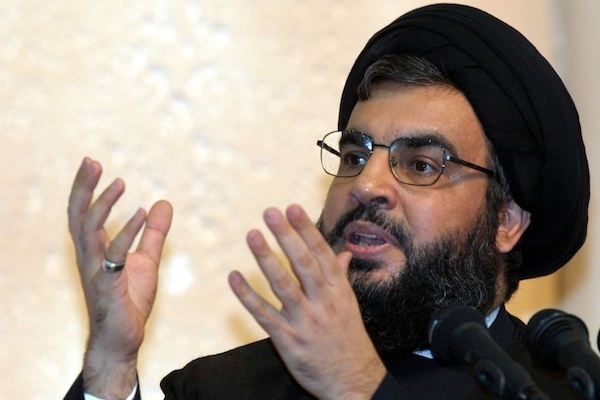Around the time that speculation was mounting about Tony Blair’s possible return to British politics last month, I went to a public discussion about faith and public life by the man himself and Rowan Williams in which Charles Moore was both participant — or should I say, combatant — and moderator. It was, as you’d expect, a lively affair in which the two Catholic converts took radically dissimilar views on most things, and Islam in particular. In retrospect, one of the remarks that strikes me as remarkable was Mr Blair’s throwaway contention that inter-faith discussion should be conducted on terms agreeable to the faiths in question. The implication was, though he didn’t say so, that no discussion of Islam would be possible that was critical of any aspect of the life of Mohammed, because that would be uncongenial and offensive to Muslims.
That remark came to mind today when I heard that the leader of Hezbollah in Lebanon, Sheikh Hassan Nasrallah, had not only called for a further week of Muslim protests about the anti-Islamic video from the US doing the rounds on YouTube but for something more far-reaching: an enforceable international law banning insults to Islam and other religions. His remarks weren’t, by the standards of most of the protests, extreme: for what it’s worth, he applauded the fact that they were directed at Americans rather than Christians in general. But it was an unwelcome resurrection of an idea that has been doing the rounds for some time, notably when the Organisation of the Islamic Conference, the OIC, tried to get the concept of respect for religion and for Islam accepted by the UN General Assembly in 2008.
Now, as it happens, Tony Blair has taken quite the right approach to the video, saying that the film was ‘wrong and offensive but also laughable as a piece of film-making — what is dangerous and wrong is the reaction to it’. Just so. But his earlier contention, that discussion of religion should be in respectful terms that their adherents can handle would not just prohibit egregiously offensive anti-Muslim propaganda, like this video, but any critical treatment of Islam. Only last week, Channel 4 had to cancel a screening of Tom Holland’s notably un-provocative documentary about the origins of Islam on security advice. If we are to censor any critical discussion of Islam on the basis of the offence given to Muslims, given the hyper-sensitivity of the community, then we shall find ourselves pre-emptively seeing off serious academic criticism of Islam’s account of itself like Tom Holland’s, let alone more robust analysis, such as ibn Warraq’s Why I am Not A Muslim, or Salman Rushdie’s Satanic Verses, which made creative play with an ambiguous verse in the Quran, let alone the Danish cartoons — which were, remember, originally intended as benign.
And that is why we should worry about Sheikh Nasrallah’s call for an international law against the expression of offensive views on Islam, which takes Tony Blair’s notion of respectful self-censorship to the extreme of legal prohibition. Of course, the British or any Western government is unlikely to run with that one. But Arab governments might well. And if they do, let’s look to Tony Blair’s Faith Foundation, handsomely supported by Arab donors, to make the case against it.
The issue of religious offence-giving and taking isn’t just an academic one for the British government. It has an instance right under its nose, in the shape of Pakistan’s blasphemy laws – the latest victim of which was an unfortunate, withdrawn Christian girl who, reportedly, has Down’s Syndrome, yet was accused of desecrating the Quran. The blasphemy laws are effectively, a means of persecuting Pakistan’s non-Muslim minorities. I spoke recently to one Christian Pakistani couple who said that Christians are terrified of carrying copies of the Quran — and children are effectively obliged to study it — lest they be accused of blasphemy and their homes targeted by mobs. Their child worried about taking his schoolbag, with Quran, with him to the lavatory in case this should be interpreted as an insult. In one case, a Christian man, stumbling against a woman, caused her to drop her Quran on a muddy path, and he was duly targeted by the clerics. This is a life-and-death issue: more long-running, if less dramatic, than the current riots across the Muslim world and much more unlikely to go away.
Britain does have a role here in the form of the enormous sums it provides Pakistan by way of overseas aid — £200 million in 2011. If I were Justine Greening, the new International Development Secretary, I’d make at least part of it dependent on reform of the blasphemy laws.







Comments